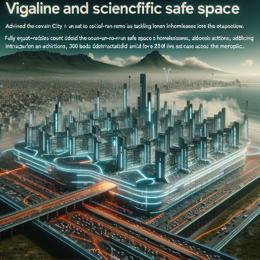Image created by AI
Cape Town Prepares to Launch New 300-Bed Safe Space for Homeless Amid Court Eviction Concerns
Cape Town - As the issue of homelessness continues to challenge urban centers globally, the City of Cape Town is taking a significant step forward with the construction of a new 300-bed facility designed to provide a safe refuge for those living on the streets. This Safe Space, currently in the works on Ebenezer Road, heralds a beacon of hope for many but is also a center of controversy following allegations of its link to recent problematic evictions at the Green Point tennis courts.
The site is optimally located beneath a fly-over bridge on an underutilized segment of the City’s Roads depot. This strategic positioning is pivotal, providing easy access for the homeless community and efficiently utilizing city space. Although the anticipation is high, municipal authorities stress the facility is not ready and should not be considered an immediate option for relocation.
The genesis of the controversy stems from an eviction conducted by law enforcement authorities, which saw individuals removed from the grounds of the Three Anchor Bay Tennis Club on February 22. Allegations arose that the Safe Space was fast-tracked as part of the City's argument in court, where they were obliged to demonstrate the availability of adequate shelter for those they wished to displace.
Carlos Mesquita, a former homeless individual and now an advocate through his organization Outsider, offered a critical voice. He expressed concerns that the City had quietly proceeded with plans for the Safe Space, appointing a service provider without public disclosure or consultation with the sector. Mesquita’s comments underline a broader debate on transparency and participation in city planning, especially when it involves marginalized communities.
However, a representative from the GOOD Party, where Mesquita is employed, states that allegations of the Green Point site being offered for immediate occupation are inaccurate. In the interim, the City recommended its two existing Safe Spaces at Culemborg for those affected by the tennis courts' eviction.
The forthcoming Safe Space in Green Point is a facet of a larger initiative, with the City working to expand its accommodations for the homeless. We can expect the total bed capacity available under Safe Spaces to exceed 1,000 upon completion of this and other projects, notably the 480 beds available at Culemborg 1 and 2 in the east CBD, 200 beds at the Paint City Safe Space in Bellville CBD, and an additional 30 beds at a planned facility in Durbanville.
A thorough examination suggests that while the intent behind expanding Safe Spaces in Cape Town is commendable, there is critical need for dialogue and coordination with stakeholders to address underlying concerns. With the city taking positive strides in its efforts to address homelessness, it's imperative that these endeavors prioritize the needs of the disadvantaged and integrate ethical practices throughout implementation.










